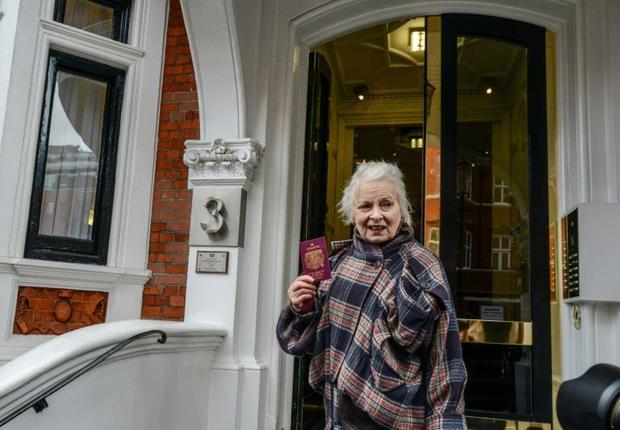Here are key dates in the five-year legal saga of Australian WikiLeaks founder Julian Assange.
- November 18, 2010:
A Swedish prosecutor issues a European arrest warrant for Assange on sexual assault claims involving two Swedish women. Assange denies the charges, saying the young women consented.
WikiLeaks starts releasing more than 250,000 classified US diplomatic cables, revealing often frank assessments of US officials as well as the views of other governments.
Some 500,000 classified military documents concerning American diplomacy and the wars in Afghanistan and Iraq had already been released by Wikileaks in July and October, 2010, respectively.
- December 7, 2010:
Assange turns himself in to police in London and is placed in custody pending a ruling on the Swedish extradition request. He is later released on bail and calls the Swedish rape allegations a smear campaign. Under the bail conditions, he must live at a supporter's mansion in England.
- February 24, 2011:
A British judge rules that Assange can be extradited to Sweden. In November Britain's High Court rejects an appeal against his extradition. Assange fears Sweden will hand him over to US authorities who could prosecute him for publishing the documents and possibly sentence him to death.
- June 19, 2012:
Assange requests political asylum at the Ecuadorean embassy in London. He is allowed to stay there by the government in Quito.
- October 25, 2013:
Ecuador demands that Britain allows Assange to fly to Quito.
- July 16, 2014:
A Swedish court upholds the European arrest warrant against Assange.
- August 18, 2014
Assange's lawyer says he will not leave the embassy until it is guaranteed he will avoid extradition to the United States.
- November 20, 2014:
Assange loses an appeal against the arrest warrant.
- September 12, 2014:
Assange files a complaint against Sweden and Britain with the UN Working Group on Arbitrary Detention.
- February 6, 2015:
WikiLeaks says the cost of policing Assange is £10 million (13 million euros, $14.5 million), the equivalent of 39,000 hospital beds. Police say they spend 11,000 euros a day on surveillance.
- February 25, 2015:
Assange's lawyers ask Sweden's Supreme Court to quash the arrest warrant.
- March 13, 2015:
Swedish prosecutors offer to question Assange in London. He initially accepts, but Quito demands later that an Ecuadorean prosecutor do the questioning.
- February 2, 2016:
Assange says he will turn himself over to British police if the UN Working Group on Arbitrary Detention rules that he has not been arbitrarily detained.
- February 4, 2016:
The UN panel rules that Assange's confinement in the Ecuadorean embassy amounts to illegal detention, Sweden's foreign ministry says.
Here are key dates in the five-year legal saga of Australian WikiLeaks founder Julian Assange.
– November 18, 2010:
A Swedish prosecutor issues a European arrest warrant for Assange on sexual assault claims involving two Swedish women. Assange denies the charges, saying the young women consented.
WikiLeaks starts releasing more than 250,000 classified US diplomatic cables, revealing often frank assessments of US officials as well as the views of other governments.
Some 500,000 classified military documents concerning American diplomacy and the wars in Afghanistan and Iraq had already been released by Wikileaks in July and October, 2010, respectively.
– December 7, 2010:
Assange turns himself in to police in London and is placed in custody pending a ruling on the Swedish extradition request. He is later released on bail and calls the Swedish rape allegations a smear campaign. Under the bail conditions, he must live at a supporter’s mansion in England.
– February 24, 2011:
A British judge rules that Assange can be extradited to Sweden. In November Britain’s High Court rejects an appeal against his extradition. Assange fears Sweden will hand him over to US authorities who could prosecute him for publishing the documents and possibly sentence him to death.
– June 19, 2012:
Assange requests political asylum at the Ecuadorean embassy in London. He is allowed to stay there by the government in Quito.
– October 25, 2013:
Ecuador demands that Britain allows Assange to fly to Quito.
– July 16, 2014:
A Swedish court upholds the European arrest warrant against Assange.
– August 18, 2014
Assange’s lawyer says he will not leave the embassy until it is guaranteed he will avoid extradition to the United States.
– November 20, 2014:
Assange loses an appeal against the arrest warrant.
– September 12, 2014:
Assange files a complaint against Sweden and Britain with the UN Working Group on Arbitrary Detention.
– February 6, 2015:
WikiLeaks says the cost of policing Assange is £10 million (13 million euros, $14.5 million), the equivalent of 39,000 hospital beds. Police say they spend 11,000 euros a day on surveillance.
– February 25, 2015:
Assange’s lawyers ask Sweden’s Supreme Court to quash the arrest warrant.
– March 13, 2015:
Swedish prosecutors offer to question Assange in London. He initially accepts, but Quito demands later that an Ecuadorean prosecutor do the questioning.
– February 2, 2016:
Assange says he will turn himself over to British police if the UN Working Group on Arbitrary Detention rules that he has not been arbitrarily detained.
– February 4, 2016:
The UN panel rules that Assange’s confinement in the Ecuadorean embassy amounts to illegal detention, Sweden’s foreign ministry says.














